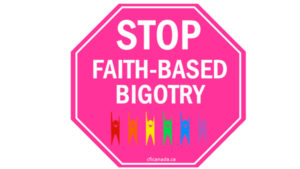 By Leslie Rosenblood
By Leslie RosenbloodIn the wake of the mosque shooting in Quebec, another in New Zealand, multiple attacks against synagogue congregations in the United States, and the bombing of Christian houses of worship in Sri Lanka, the Canadian House of Commons Standing Committee on Justice and Human Rights decided to look into online hate speech, its link to violence, and whether Canada should amend its criminal code or other legislation in response.
This is often the first step in the legislative process: The government is considering enacting a new law or modifying an existing one, so it calls witnesses from various stakeholder groups to testify before a parliamentary committee. In this way, the government gets a range of perspectives before taking any action. Often, the decision is not to proceed with any legislative or regulatory changes.
The Justice Committee invited many religious organizations to present their views, which makes sense given the attacks on numerous houses of worship. The Committee also invited the Canadian Secular Alliance (CSA) to give a presentation, and on May 9, 2019, I was in Ottawa with Greg Oliver, President of the CSA, to provide a secular perspective on how to respond to recent events.
The mandate of the hearings was broad: Noting a substantial increase in reported hate crimes in Canada (though more incitement of hatred than violence), the Committee was asking about potential amendments to the Canadian Human Rights Act, Criminal Code, or other Acts to help stem the propagation of hateful acts (and their enticement), especially given that Canadians increasingly get their news and communicate online.
It was a challenge to address such a wide-ranging topic in a structured, coherent manner with less than two weeks to prepare and just eight minutes to speak. But after researching the subject and working through several drafts, our presentation addressed three main issues.
- Government Neutrality. People deserve protection from harm; ideas do not warrant protection from criticism. The government must remain neutral in matters of religion, and must not conflate attacks on an idea (religion) with an assault on a person (worshipers).
- Equal Protection under the Law. Section 319(3)(b) of Canada’s Criminal Code allows as a defense against hate speech prosecution that the remarks are “based on a belief in a religious text.” It’s patently unjust that one person espousing hate out of (say) racial prejudice is subject to a criminal conviction, while another promulgating the identical vitriol is exempt if the hate is founded in a religious text. The Canadian Secular Alliance recommended repealing Section 319(3)(b).
- Free Speech. Though restrictions on unfettered free speech are in principle justifiable — most people agree with well crafted laws against libel, impersonation, threats, and incitement to violence — any such restriction must pass a high burden of proof. Hate speech laws are particularly challenging. If hate speech is narrowly defined, it will have a minimal impact on public discourse and not significantly address the issue. Broaden the scope of disallowed speech too much, however, and the new law would violate Section 2(b) of the Canadian Charter of Rights and Freedoms, which protects freedom of expression.
The topic of how social media has changed the way people communicate and interact is complex and filled with measures having unintended and counterproductive consequences. The CSA urged restraint, research, and (as I put it in response to a pointed question from a member of the Committee) the importance of acting correctly over quickly.
